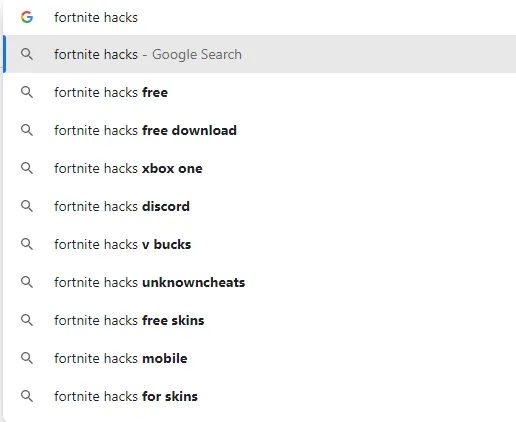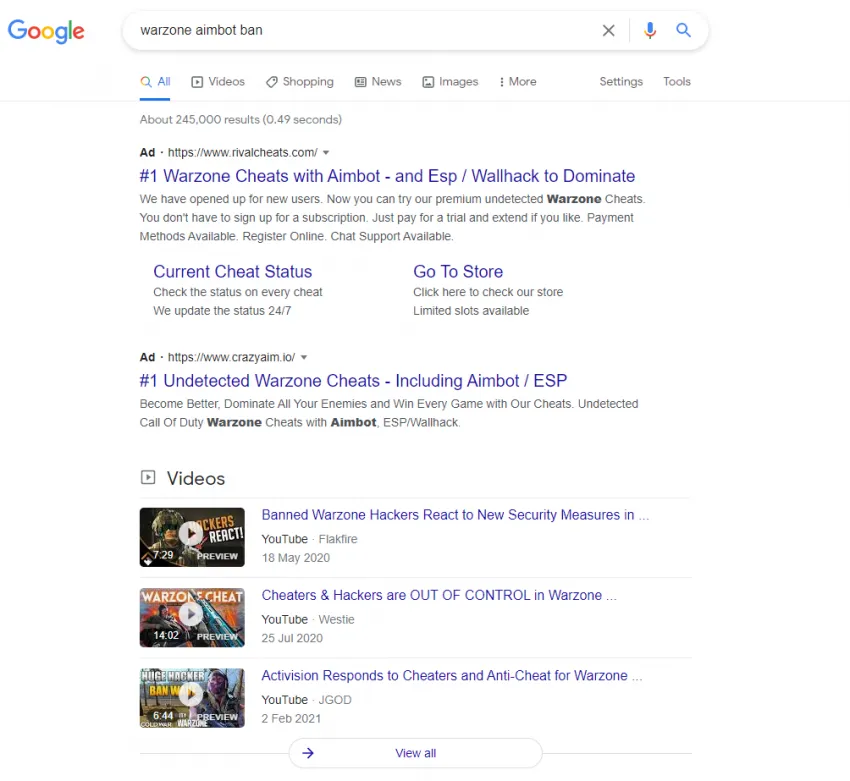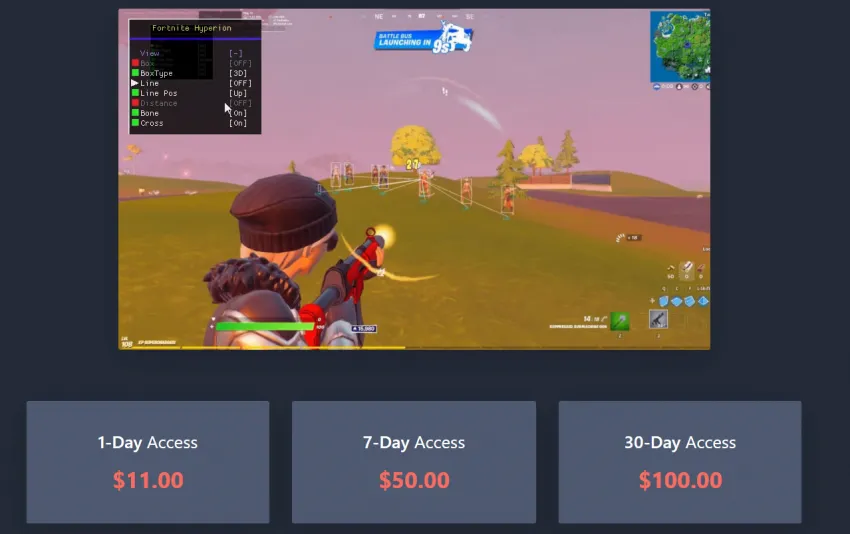How Are Children Cheating In Their Games? The Slippery Slope To Hacking
In a previous article, I went in-depth into what Hacking is compared to other terms like cheating, exploiting, and modding. With modding becoming increasingly normalised and accessible, it can be hard to tell exactly what a child Is downloading or adding to their games. The article in question covered the idea that the innocence of editing a game is entirely dependent on the game, and the manner of the change.
It is easy as an adult who spent their whole childhood gaming to glance at a bit of software or a website offering mods/hacks and identify straight away the festering criminal activity underneath.
But, in all the time I have spent getting a firm grasp on the videogame industry and its shady practices (In fact, maybe directly because of that!), I have not had a kid! So upon finishing my informative piece I was left with some grave concerns.
How do we combat manipulative hack selling? Who is their target audience? What information needs to be shared beyond basic definitions? This piece will clarify exactly why hacking is such a huge problem for children, and how to begin to combat it as a parent or concerned guardian.
For those of you that speedran my other piece and missed skipped some key dialogue there:
Videogame Hacking is the process of editing a game to gain an advantage. Essentially the “performance-enhancing drugs” of the online world (Although there are also, scarily, real drugs for videogame enhancement too).
You edit game files, trick game processes, or otherwise, tamper with a game system to cheat. This can be as simple as editing health values or as advanced as hacking scripts that play the game themselves.
Games are built on scripts, a whole bunch of commands that play out as the game runs. They determine what happens in the game and the logic of the game. So, if I add or tamper with scripts I can effectively change how the game works.
Why does Videogame Hacking affect my child?
If you have a pre-teen or early teen child they are likely to have been exposed to Fortnite, Among Us, and other huge gaming hits. Depending on accessibility to their console/computer/phone they could also have played the standard array of Shooters; that’s your Halo and your Call of Duty and your Grand Theft Auto.
The important thing to note here is that every single one of those games, the top games for young people to be playing right now, has online connectivity. That means, particularly in Fortnite, the player is exposed to hundreds of random people every session. Even without the ability to chat with these people, the sheer numbers alone are enough to begin the process towards vulnerability to hacking.

Competing against that many real-world people, a lot of whom will be kids the same age maybe even from the same school is enough to begin the cogs turning. Winning becomes a priority of course, but so does showing off “Skins” and “Emotes”. Your child is unlocking these character models and gestures through play but also potentially through shady online stores.
That desire, that needs to fit in and be a part of the 1% who got the rarest skin, is fuel for the fire. The motivation can be there regardless of whether a child has direct contact in text or voice chat with someone trying to offer them “cheap V-bucks” or “Easy Wins”.
Even a perfect child is still a child, and these criminals know this. They know there is a vulnerability and will capitalise it in exactly the same way any brand capitalises on their target audiences’ weaknesses. But, in the case of children, they aren’t always aware that manipulation is even possible.
Can A Child Access Hacks?
Yes. Anyone with access to Google (Or Bing or Safari or DuckDuckGo or…) can access these shady sites far, far too easily. To demonstrate; I was researching for these two articles, the one on definitions and then this one. During that time I spoke exclusively in negatives about hacking and cheat selling. Despite that, despite my clearly opposed intent, this is what google served up at the top of the search page:

Disgusted is the word I’d use. Actually, I’d use some more words than that but don’t want to give the parent reading this a chance of their child discovering a whole new depth of insult.
If your child is even vaguely curious, even just looking up what hacking is because a friend said the word at school…even then the cogs are spinning and the process is underway. In some ways, there’s no avoiding it. What we can do, though, is combat it.
Are Hacking Sites Safe? Why do we need to combat them?
For one, no one trying this hard to weasel their way into your wallet is legit. But, on a more serious note, no sites selling hacks and cheats are safe. Downloads from these sites come with no guarantee of safety or even supplying a service, to begin with. They cover their own tracks in endless T&C's and all of the state there's no guarantee your data, account, or wallet are safe.
Worse still is that even if the transaction goes off and the cheat is received without a hitch, there’s then the perpetual risk your child is caught using the cheat and punished. This can be account deletion in some cases, which means, even more, lost money.
Of course, the sellers don’t mind because every new account is a new transaction as people try and cheat their way back to where they were. It’s loops and logic like that which make this landscape so dangerous to children.
While an adult might see at one of these steps that this cycle is bad, and they are making a mistake, a child might simply see it as something going wrong, as a new challenge, as “unfair” on them.
These sites establish themselves as properly as they can. Unlike something like a free game download site or torrent where there are 50 different download buttons and only one is right (Oh, the memories), these hacking sites are brazenly simple;
- An article on the front page explaining hacks and cheats and speaking as if they are a business, not a cesspool
- A few comments on staying “safe” while using their hacks (The irony is not lost on me)
- Links to, naturally, spend all your money.

It’s easy for people like me to victim-blame and expect people to know better, but actually these sites really have evolved since back in the day. A completely uninitiated person would easily be fooled into thinking these sites really are google-endorsed results that are legitimate businesses.

With blogs, services, email blasts…the whole thing seems better to put together than some real stores I’ve been to! The reason we need to combat this sort of thing is self-apparent as soon as one google-search in.
These sites are pushed into your children’s faces the moment they discover the word “hack”. With roots, this deep and a front this strong, prevention isn’t going to be effective. At this point, the cure is going to be as vital as prevention.
How To Find Out If Your Child Is Hacking
The usual methods for tracking your child’s activity can often pick things like game hacking up. Having search history public and limiting their search functions at a younger age is of course the simplest. But, with the school playground, friends’ older brothers, phones with less restricted systems…it all adds up fast against your ability to control.
And, to be honest, control shouldn’t need to be the solution. Refusing a kid the chance to find something incredible online because of these sites is letting the criminals win.
Not to mention these sorts of controlling measures only work up to a certain age, and teens need their freedom. Unfortunately, that’s exactly what these criminals rely on. They leap at the chance to take that freedom and convince the teens that all that underlying FOMO (Fear Of Missing Out) and social aspects and skill aspects that have been bubbling in their online gaming life for years are worth $100 a month.
Once children reach the early and mid-teens the restrictions start being removed. At this stage, you have a couple of other options.
The first option is to try and blacklist the specific sites that provide the cheats, simply try and find them and they’ll come pouring in. Block them all and make sure it updates on their phone search engine too. This is arduous and not 100% effective, though.
A second option is to monitor not their activity from a prevention point of view, but their activity in games. Some children who genuinely were lured in without knowing better will outright tell you or proudly show off their hacks, unaware of what they’ve got into. Older kids might be more clued in, and you’ll have to be more active in watching or looking back at their game statistics.
A third option is rather than looking at the access to the hacks, or the use of the hacks, to look in the middle. The acquisition of the hacks. These things aren’t free, and if they are you’ll have not only a hacking problem but almost certainly a few viruses to contend with too.
If your child’s equipment starts misbehaving do a quick sweep for gaming hacks. If you see irregular spending you are in a similar situation and will have to do some digging.
Another option is, of course, addressing this with the child themselves. I’ve done that thing people always do with kids where we have whole conversations as if they aren’t in the room. It’s a rude and odd habit humans have, but it is hard to snap out of.
So, remember that they are the heart of this. It’d be nice to eradicate hacking sites and remove the problem, but that’s just unrealistic unless somehow every parent in the world reads this.
Realistically, each child should simply be asked what they think of cheating. Ask them why they might cheat, if they’ve seen anyone cheat before (Not just in video games), and what effect it had.
Getting to know your child’s view on the matter might help diagnose any potential problems when they discover these sites or people using them. If your kid has to be the one in the group who questions the others, maybe for the first time ever, about why they are doing what they are doing then progress will have been made.
Just like the tiniest sparks start the vulnerabilities turning in favour of these scammers, we can start turning our own cogs too.
Looking to the future
With a lot of motion in the gaming industry ocean recently being focused on the big industrial-level threats, plenty of independent scammers are flying under the radar.
Every big uproar about scalpers taking advantage of the vulnerable or loot boxes being gambling are great discussions to have, but also serves a lot of people as focal points. They see the big issue and then move on, ignoring the constant underbelly of things like hack sites.
With gaming becoming more mainstream more people will be clued-in to fight against this black market, but equally, there will be more demand for it. Make sure you and your friends, family, and colleagues are all on the right side.

Opinions and Perspectives
After reading this I checked our credit card statements. Found monthly charges from a hack site. Scary stuff.
Maybe game companies could offer parent-approved shortcuts instead of forcing kids toward these shady sites.
Wish more parents understood this issue. Most I talk to just dismiss gaming concerns entirely.
The article nails it about Google results. Just searched hack related terms and was shocked what came up.
Monitoring kids' gaming seems impossible these days with phones, consoles, and computers all connected.
Been gaming for 20 years and never seen the hacking problem this bad. It's really changed the landscape.
I've seen kids as young as 8 talking about game hacks. We need to start education early.
Until game companies crack down harder on cheaters, this problem won't go away.
The social pressure to have rare skins and items is intense. Kids feel left out without them.
Parents need to understand that gaming culture has changed. What worked for us won't work for our kids.
These hack sellers are getting smarter. They even have customer service and money-back guarantees now.
I appreciate the balanced approach here. Prevention and cure both matter when dealing with this issue.
The article underplays how addictive winning through hacks can be. My son couldn't stop once he started.
We banned Fortnite at home after finding hack charges. Maybe extreme but we didn't know what else to do.
The comparison to drug dealing is apt. They get kids hooked on easy wins, then keep charging more.
My kids schools should really address this issue. They teach about cyberbullying but not about game hacking risks.
As a game developer, I see the damage these hacks do to our communities. It ruins the experience for everyone.
Fascinating how these hack sellers have evolved. They're much more sophisticated than the old days of obvious scam sites.
The suggestion about asking kids their views on cheating is really smart. Makes them think critically about it.
Having dealt with a hacked account, I can confirm these sites are dangerous. Lost all my son's progress and items.
I understand the concerns but think we're overreacting. Kids have always found ways to cheat at games.
Just checked my son's browser history after reading this. Found several hack sites. Time for a serious talk.
Anyone else notice how these hack sellers often target games popular with younger kids? That seems intentionally predatory.
The link between hacking and identity theft is scary. Once these sites have your payment info, who knows what they do with it.
I see both sides. Yes, hacking is wrong, but game companies also create these artificial scarcities that tempt kids.
My teenager spent over $200 on hacks before we caught on. Parents really need to watch their credit cards carefully.
When I was young we just used cheat codes that came with the games. This new world of paid hacks is really concerning.
What surprised me most was how these sites use professional marketing tactics. They're running like legitimate businesses.
The article makes good points but seems a bit alarmist. Not all mods are dangerous, some actually enhance gameplay safely.
I work at a school and we've started seeing kids trading hack accounts during lunch breaks. It's becoming a real problem.
Completely agree about having open conversations with kids about cheating. It's worked well with my daughter.
You mentioned monitoring game statistics, but many games don't make this easy for parents. We need better tools.
I feel like we need stricter laws against these hack sellers. They're basically running a digital black market targeted at minors.
Thank you for opening my eyes to this. I always thought game hacking was harmless fun but never considered the criminal aspect.
The part about viruses is so true. I've had to clean up my nephew's computer twice because of sketchy game mods.
Interesting article but I feel it missed addressing the peer pressure aspect. My kid says everyone in his class uses these hacks.
Those FOMO tactics they use are really predatory. Targeting kids with limited time and money is just wrong.
I actually work in cybersecurity and you wouldn't believe how many young people get their start through game hacking. It's a serious gateway.
Let's be real though, game companies share some blame here. If they made items more accessible, kids wouldn't be so tempted by these shortcuts.
My son actually showed me a hack he got for free. Turned out it filled his computer with malware. Expensive lesson learned.
I disagree about restricting search functions. Kids need to learn about the internet, not be sheltered from it. Better to educate them about the risks.
The scariest part is how professional these hacking websites look. I can totally see why kids would think they're legitimate businesses.
I found it shocking that these hack sites appear right at the top of Google searches. Shouldn't there be better content filtering for this kind of stuff?
The comparison to performance-enhancing drugs is spot on. We need to teach kids that cheating in games is just as wrong as cheating in real sports.
As a parent of two gamers, I'm really concerned about how easily accessible these hacking sites are. My kids play Fortnite and I had no idea it was this serious.
